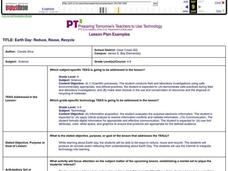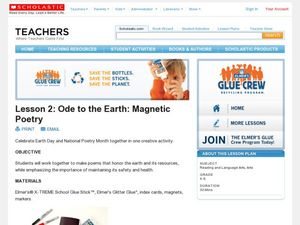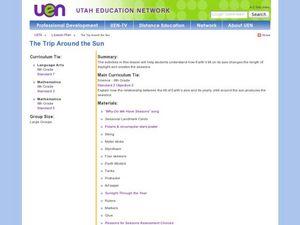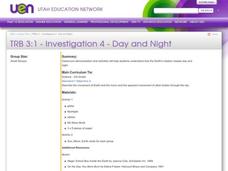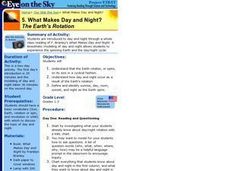California Academy of Science
Kinesthetic Astronomy: Longer Days, Shorter Nights
A lamp, four globes, and some signs taped around the room are all you need to set up a solar system simulation for teaching how Earth's tilted axis creates the seasons. (Sticky dots are also needed, but not mentioned in the materials...
Curated OER
Earth Day: Reduce, Reuse, Recycle
Students list ways to reduce, reuse and recycle, and produce an acrostic poem reflecting their understanding about Earth Day. They also use the Internet to integrate technology into learning.
California Academy of Science
Kinesthetic Astronomy: The Meaning of a Year
How many times have you traveled around the sun? Aspiring astronomers grasp what a year is and they differentiate between orbit and rotation by walking around the sun right within your classroom. Place a lamp in the center of the room to...
Curated OER
Flowers and a Beautiful World: Earth Day (1st)
Students consider caring for their environment. In this environmental stewardship lesson, students read Miss Rumphius and discuss how sharing their time, talent, and treasure through volunteering makes the world better.
Curated OER
"101 Amazing Earth Facts" Game
Students read for comprehension, work cooperatively to learn "101 Amazing Earth Facts," and compete as teams in a Jeopardy-like game.
Curated OER
Ode to the Earth: Magnetic Poetry
Students explore Earth Day by creating an arts and crafts project. In this nature appreciation lesson, students utilize nature related vocabulary terms on magnets and put them in different orders to create interesting poetry. Students...
Curated OER
Modeling the Seasons
Junior geologists become the force that makes the world go around! With a lamp on the floor in the middle of the room to represent the sun, volunteers hold a globe, revolve, and rotate. Observers notice how the light hitting the globe...
Curated OER
Earth's Rotation
Fourth graders investigate the Earth's rotation. In this Earth's rotation lesson, 4th graders realize that the rotation of Earth causes the days and nights on Earth. Students break into groups and use a flashlight and a sphere to...
PBS
Experience a Solar Eclipse
Didn't catch the last solar eclipse? Now every day can be eclipse day, thanks to an interactive lesson from PBS' Space series for middle schoolers! The well-rounded multi-media experience includes video clips, an interactive, and...
Salt River Project
How Do We Clean Polluted Water?
How do we clean up oil spills and other pollutants in the water? Explore water treatment strategies with a set of environmental science experiments. Groups remove oil from water, work with wastewater treatment, and perform a water...
Curated OER
Density of Rocks
Given a variety of rocks, junior geologists calculate densities and correlate them to Earth's layers. As a simulation of continental crust, they experiment with how materials of differing density float in water. Finally, they...
Curated OER
Models of the Earth and Moon
Students explore the earth's rotation and phases of the moon. In this planets lesson, students rotate and revolve around a light representing the sun. Students use movement and props to simulate what causes the phases of the moon as well...
California Academy of Science
Kinesthetic Astronomy: Mars Opposition Dance
Your class will watch as one child orbits the sun as Earth, while another orbits as Mars. If the timing is right, they will see the repetitive dance between the two planets and discover how often they are opposite from each other. For...
Curated OER
Day And Night
First graders examine how the earth experiences day and night by using a flashlight and a globe as a model.
Curated OER
Science Videos
Young scholars plan, practice, and act in a 2-3 minute videotaped production about a specific topic. Students from a local high school give presentations pertaining to seasons, earth rotation, and moon phases. Young scholars analyze the...
Curated OER
The Water Cycle
Fifth graders explore the major components of the water cycle. They pay close attention to evaporation, condensation, and precipitation. A water cycle kit is set up in the classroom, which learners observe for a couple of days before the...
Curated OER
The Trip Around the Sun
Sixth graders investigate the relationship between the tilt of the Earth's axis and the seasons. In this earth science lesson, 6th graders sing the song "Why Do We Have Seasons" and use simulate the Earth's tilt by using their bodies.
Curated OER
Sky Time: On the Astronomical Meaning of the Day, Year and Seasons
Students simulate the movement of the Earth using their body motion. In this earth science lesson, students explain how this causes seasonal changes on Earth.
Curated OER
Introduction to the Day and Night Sky
Students explore space science by participating in a sky observation activity. For this astronomy lesson, students define a list of astronomy vocabulary terms and examine star charts of the four seasons. Students gather with their...
Curated OER
Day and Night
Third graders view a classroom simulation that demonstrates how the Earth's rotation creates day and night.
Curated OER
What Makes Day and Night? The Earth's Rotation
Students discover that the Earth rotates on its axis in a cyclical fashion. They examine how this rotation results in day and night.
Curated OER
Earth, Sun and Moon
Students investigate that the sun is at the center of the solar system through role play. One student is the sun and one student is the Earth. The students then show how the Earth orbits around the sun. Students view a flashlight and...
Astronomical Society of the Pacific
Getting Ready for the All American Eclipse!
Give your pupils a front row seat at the biggest light show in the sky this year! In addition to admiring the total solar eclipse, young astronomers can explain the phenomenon with a little help from an inquiry-based lesson. The focus of...
Science 4 Inquiry
Phases of the Moon
The moon takes just over 27 days to orbit around Earth. Young scientists position themselves as the earth as they rotate around the sun and hold the moon. This allows them to observe the patterns and phases of the moon.
Other popular searches
- Science Earth Day Activities
- Science Earth Day Lessons
- Science Earth Day
- Earth Day Science Projects
- Earth Day Science Lesson Plans
- Earth Science Earth Day



